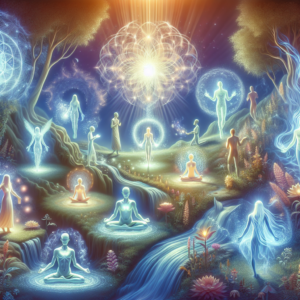Spiritual Devotional about Non-Duality and Oneness
Embracing Non-Duality: The Journey to Oneness
Hello, dear friends! Today, let’s embark on a journey into the heart of spirituality by exploring the concept of non-duality and how it leads us to embrace Oneness. This is not just a philosophical idea but a profound spiritual truth that aligns beautifully with divine principles found within scripture. So, let’s dive in, uplift our spirits, and be inspired by this path of connectedness.
Understanding Non-Duality
At its core, non-duality is the understanding that there is no separation between the self and the universe. It is the realization that beneath all distinctions, there is a single, unified reality. This might sound complex, but it’s deeply woven into the fabric of many spiritual teachings, encouraging us to see beyond the illusion of separateness.
Biblical Principles and Oneness
The Bible, with its timeless wisdom, beautifully echoes the essence of non-duality. Paul, in 1 Corinthians 12:12-14, reminds us, "For just as the body is one and has many members, and all the members of the body, though many, are one body, so it is with Christ." Here, we see that we are all interconnected, like different parts of a single body, each integral to the whole.
Ephesians 4:4-6 further illuminates this truth: "There is one body and one Spirit—just as you were called to the one hope that belongs to your call—one Lord, one faith, one baptism, one God and Father of all, who is over all and through all and in all." This passage unites us under one divine reality, urging us to see the Oneness that prevails amidst diversity.
Embracing Oneness
Living with the awareness of non-duality enriches our lives with compassion and love. When we recognize that we are all intertwined in the divine web of creation, it becomes natural to extend kindness and understanding to others. The barriers that divide us—whether they be cultural, social, or personal—begin to fade away, replaced by a deep sense of unity and shared purpose.
Living the Truth of Oneness
In practical terms, adopting this mindset means living with an open heart. It’s about seeking connections rather than divisions and encouraging others to embrace their unique roles within our collective tapestry. When we choose to see the divine reflection in everyone, our relationships thrive, our communities strengthen, and we move closer to fulfilling the prayer of Jesus in John 17:21: "that all of them may be one, Father, just as you are in me and I am in you."
An Encouraging Step Forward
So, how can we start living in alignment with this beautiful principle of Oneness? Begin by cultivating awareness. Every thought, action, and word can be a reflection of our choice to see connection over separation. Engage in moments of stillness and prayer, allowing the spirit of unity to guide you. Seek opportunities to serve others, to laugh with them, to share your joys and bear their sorrows.
As we journey together, let us rejoice in the endless possibilities that Oneness brings. Let us celebrate the divine spark that resides within each of us, trusting that this collective realization will bring about greater peace, understanding, and love in our world.
May your spirit be lifted and your heart filled with joy as you step into this wondrous truth of non-duality and Oneness. Remember, we are One in the divine tapestry of life, woven together by the Spirit that flows through all.
Blessings of unity and love to you all! 🌟
Explore and dig up answers yourself with our BGodInspired Bible Tools! Be careful – each interaction is like a new treasure hunt… you can get lost for hours 🙂
Q&A about Non-Duality and Oneness
Certainly! Here’s a Q&A that explores the concepts of Non-Duality and Oneness:
Q1: What is Non-Duality?
A1: Non-Duality, often referred to in spiritual and philosophical contexts, is the perspective that there is no intrinsic separation in existence. It suggests that everything is interconnected and that dualistic distinctions such as self and other, subject and object, or mind and body are ultimately illusory. This perspective is central to many Eastern traditions, such as Advaita Vedanta in Hinduism and certain schools of Buddhism.
Q2: How does Non-Duality relate to Oneness?
A2: Non-Duality and Oneness both emphasize the unity and interconnectedness of all things. While Non-Duality focuses on the transcendence of perceived separations, Oneness highlights the inherent unity and singular essence of existence. Together, they propose that beneath the diversity of the world, there is a fundamental oneness that transcends all forms of duality.
Q3: What are some practices that can help one experience Non-Duality or Oneness?
A3: Practices that encourage an experience of Non-Duality or Oneness often involve meditation, mindfulness, and self-inquiry. Techniques such as focusing on the breath, observing thoughts without attachment, or inquiring into the nature of the self (such as the question "Who am I?") can help dissolve the illusion of separation and cultivate an awareness of the underlying unity of all things.
Q4: Can Non-Duality be understood intellectually, or is it purely experiential?
A4: While one can study and intellectually explore the concepts of Non-Duality and Oneness, many traditions emphasize that true understanding is experiential. It’s often described as a shift in perception or consciousness that can’t be fully captured through words or reason. Direct experiences, such as moments of profound peace or insight, often reveal the nature of Non-Duality more vividly than conceptual understanding alone.
Q5: How does the concept of Non-Duality influence ethical behavior?
A5: The realization of Non-Duality can profoundly impact ethical behavior by fostering a sense of compassion and empathy. If one truly understands that there is no ultimate separation between oneself and others, it naturally leads to treating others with kindness and respect. Actions that benefit others are seen as inherently beneficial to oneself as well, promoting a sense of collective well-being and responsibility.
Q6: Do scientific perspectives support the idea of Oneness?
A6: While science often presents a more dualistic and reductionist view of reality, certain areas of study, like quantum physics, have suggested a more interconnected and holistic understanding of the universe. Concepts such as the interconnectedness of quantum particles or the idea of a unified field resonate with the philosophical ideas of Oneness and Non-Duality, although they operate within different frameworks and languages.
These questions and answers provide an overview of the rich and profound concepts of Non-Duality and Oneness, inviting both intellectual exploration and personal experience.


